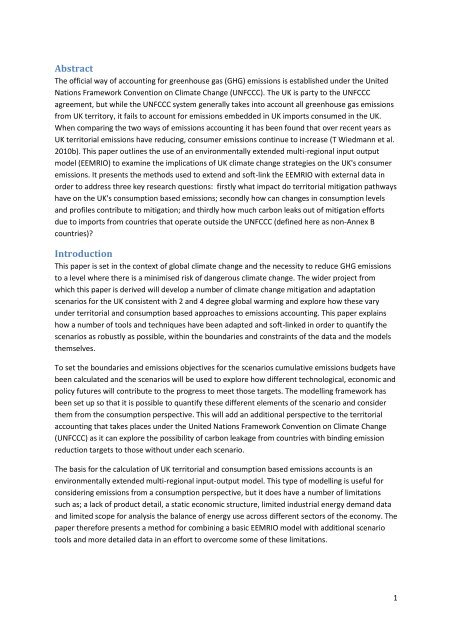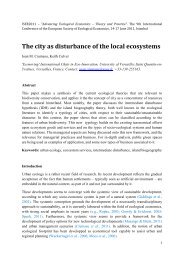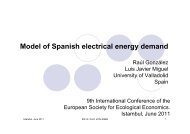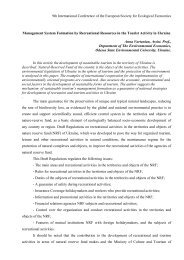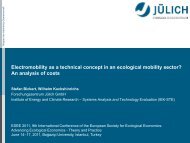Full Paper - ESEE 2011 - Advancing Ecological Economics
Full Paper - ESEE 2011 - Advancing Ecological Economics
Full Paper - ESEE 2011 - Advancing Ecological Economics
You also want an ePaper? Increase the reach of your titles
YUMPU automatically turns print PDFs into web optimized ePapers that Google loves.
Abstract<br />
The official way of accounting for greenhouse gas (GHG) emissions is established under the United<br />
Nations Framework Convention on Climate Change (UNFCCC). The UK is party to the UNFCCC<br />
agreement, but while the UNFCCC system generally takes into account all greenhouse gas emissions<br />
from UK territory, it fails to account for emissions embedded in UK imports consumed in the UK.<br />
When comparing the two ways of emissions accounting it has been found that over recent years as<br />
UK territorial emissions have reducing, consumer emissions continue to increase (T Wiedmann et al.<br />
2010b). This paper outlines the use of an environmentally extended multi-regional input output<br />
model (EEMRIO) to examine the implications of UK climate change strategies on the UK's consumer<br />
emissions. It presents the methods used to extend and soft-link the EEMRIO with external data in<br />
order to address three key research questions: firstly what impact do territorial mitigation pathways<br />
have on the UK's consumption based emissions; secondly how can changes in consumption levels<br />
and profiles contribute to mitigation; and thirdly how much carbon leaks out of mitigation efforts<br />
due to imports from countries that operate outside the UNFCCC (defined here as non-Annex B<br />
countries)?<br />
Introduction<br />
This paper is set in the context of global climate change and the necessity to reduce GHG emissions<br />
to a level where there is a minimised risk of dangerous climate change. The wider project from<br />
which this paper is derived will develop a number of climate change mitigation and adaptation<br />
scenarios for the UK consistent with 2 and 4 degree global warming and explore how these vary<br />
under territorial and consumption based approaches to emissions accounting. This paper explains<br />
how a number of tools and techniques have been adapted and soft-linked in order to quantify the<br />
scenarios as robustly as possible, within the boundaries and constraints of the data and the models<br />
themselves.<br />
To set the boundaries and emissions objectives for the scenarios cumulative emissions budgets have<br />
been calculated and the scenarios will be used to explore how different technological, economic and<br />
policy futures will contribute to the progress to meet those targets. The modelling framework has<br />
been set up so that it is possible to quantify these different elements of the scenario and consider<br />
them from the consumption perspective. This will add an additional perspective to the territorial<br />
accounting that takes places under the United Nations Framework Convention on Climate Change<br />
(UNFCCC) as it can explore the possibility of carbon leakage from countries with binding emission<br />
reduction targets to those without under each scenario.<br />
The basis for the calculation of UK territorial and consumption based emissions accounts is an<br />
environmentally extended multi-regional input-output model. This type of modelling is useful for<br />
considering emissions from a consumption perspective, but it does have a number of limitations<br />
such as; a lack of product detail, a static economic structure, limited industrial energy demand data<br />
and limited scope for analysis the balance of energy use across different sectors of the economy. The<br />
paper therefore presents a method for combining a basic EEMRIO model with additional scenario<br />
tools and more detailed data in an effort to overcome some of these limitations.<br />
1


